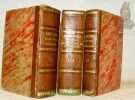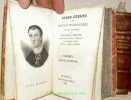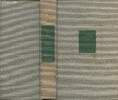51 books for « machiavelli niccolo »Edit
-
Language
French (46)
Italian (1)
Russian (4)
-
Century
16th (4)
17th (1)
18th (4)
19th (9)
20th (12)
21st (1)
-
Countries
Belgium (2)
Denmark (7)
France (30)
Italy (4)
Switzerland (4)
United States of America (4)
-
Syndicate
ILAB (32)
NVVA (1)
SLACES (1)
SLAM (20)
Lettere di Niccolò Machiavelli che si pubblicano per la prima volta.
1767 in Firenze, Nella Stamperia Granducale, 1767. Dedicate a Sua Eccellenza Milord Nassau Clavering Conte di Cowper, Visconte di Fordwich, Barone di Wingham, e Cav. Baronetto, Pari della Gran Bretagna. Con blasone del dedicatario al frontespizio.1769”. In 8voTres belle reliure d'epoque velin tendu , superbe dos lisse , piece de titre et auteur , parfait etat , photos sur demande
Ray vitrine galerie *
Histoire de Florence. Traduction nouvelle. 2 vols.
Amsterdam, Henri Desbordes, 1694. 8vo. Uniformly bound in two contemporary full calf bindings with five raised bands and richly gilt spines. Edges of boards gilt. Small paper label pasted on to upper compartment of spines. A very nice set. (34), 588 pp. 624 pp.
A fine late 17th century-edition of Machiavelli's Florentine Histories" his famous account of the political events and power struggles in Florence during the Renaissance. Essentially being a panegyric to the house of Medici, Machiavelli's work offers valuable insights into the rise and fall of political factions, the challenges faced by republican governments, and the dynamics of power in a city-state. Although often overshadowed by his more famous 'The Prince', the present work is important in understanding Machiavelli's broader political philosophy and is an indispensable document in understanding renaissance politics in general. The Histories constitute an essential work for understanding the political development of the late Machiavelli, and is “also an important item in modern historiography because for the first time the issue of conflict, and more precisely of urban conflict, finds itself at the heart of historical narrative (…).Infact, the Histories constitute the first attempt in modern historiography to analyze the totality of individual and collective agents and factors that allow a community to sustain itself or to founder. This analytical quality was certainly at the basis of the interest in the work outside Florence and the fact of its being translated. As Yves de Brinon explains in dedicating his ‘Histoire Florentine [the present work] to Cathrine de Medici, the case of Florence is a model for the dangers that threaten the integrity of every state and the Kingdom of France in Particular.” (Landi, A re-reading of Machiavelli). Machiavelli visited France, representing the Republic of Florence, where he - and later his writings - exercised great influence. The Huguenot, Innocent Gentillet, whose work commonly referred to as 'Discourse against Machiavelli' or 'Anti Machiavel', accused Machiavelli of being an atheist and accused politicians of his time by saying that his works were the ""Koran of the courtiers"", that ""he is of no reputation in the court of France which hath not Machiavel's writings at the fingers ends"" (Birely, The Counter Reformation, 1990). “Although Machiavelli became the embodiment of a real ""devil theory of history,"" there was nothing supernatural or even suspicious about his journey across the Alps. As the French translator remarked to his customers in 1544, ""This Florentine merchant has voluntarily left his own country to be received into yours.... Do not be so ungracious as to refuse him citizenship. From all appearances he was welcomed with open arms, or at least open minds. Within a few years, one of his admirers declared that he was a prophet honored more in France than in his own country."" (Kelley, Murd'rous Machiavel in France: A Post Mortem). Following the crisis of 1513, which involved arrests for conspiracy and torture, Machiavelli's relationship with the Medici family gradually improved. Despite the dedication of his book ""Il Principe"" to Lorenzo II de' Medici having little effect, Machiavelli found favor with a faction in Florence that was not opposed to him and was granted an appointment. In a letter Machiavelli expressed his dissatisfaction with his idle state and offered his valuable political experience to the new ruler. To further solidify his position, Machiavelli, adopting a somewhat courtier-like attitude, arranged for the staging of his play ""Mandragola"" at the wedding of Lorenzino de' Medici in 1518. In 1520, he received an invitation to Lucca for a semi-private mission, indicating that his ostracism was coming to an end. Later that year, Giulio Cardinal de Medici commissioned him to write a history of Florence. Although this was not exactly the role he desired, Machiavelli accepted it as the only way to regain the favor of the Medicis. The purpose of the work, although unofficial, was to restore the city's official historical standing. The salary for this appointment was not substantial, starting at 57 florins per year and later increased to 100. In May 1526, Machiavelli formally presented the finished work to Giulio de' Medici, who had become Pope Clement VII. The Pope appreciated the work and rewarded Machiavelli, though only moderately, and sought his support in creating a national army based on his theoretical work ""The Art of War,"" in preparation for the War of the League of Cognac. However, Machiavelli's hopes were shattered following the Sack of Rome in 1527 and the fall of the Medici government in Florence. Soon after, Machiavelli passed away.
Le Prince. Traduit d'Italien en Francoys Par Guillaume Cappel. - [THE BIRTH OF MODERN POLITICAL THOUGHT]
Paris, Charles Estienne, 1553. Small 4to. Bound in a lovely 19th century red morocco binding with five raised bands and gilt ornamentations to spine. Boards with blindstamped frame-borders and gilt ornamental centre-pieces. All edges of boards gilt and inner gilt dentelles. All edges gilt. ""E. THOMAS"" discreetly printed to top of front free end-paper. Front free end-paper with woodcut armorial book-plate (Bibliotheque du Plessis Villoutreys). First and last leaves with a bit of brownspotting, otherwise very nice and clean throughout. The last three leaves with neat restorations - neatly closed tear, with no loss and a couple of small restorations to top margin (far from affecting text). (8), 148 pp. Estienne's printer's device to title-page and woodcut initials.
The extremely rare first translation printed in any language, being the first printed French translation, of one of the most important and influential works in the history of mankind, Machiavelli's ""The Prince"". After the original printing in Italian, the present is arguably the most desirable edition of the seminal masterpiece that is Machiavelli's magnum opus. ""The Prince"" constitutes the beginning of modern political philosophy and one of the most influential works in the history of modern thought. It founded the science of modern politics on the study of mankind, and even today no political thinker can disregard the importance of this masterpiece of political theory.The translation not only inaugurated the tradition of translating ""The Prince"" into other languages than Italian, it also exercised the greatest influence upon the entire Machiavellian tradition and constitutes an immeasurable historical source in its own right. Although the work was never reprinted and this extremely scarce edition is the only available version of the text, the effects of it are still clearly visible in our times. It secured the diffusion of the text throughout Europe and it served as the basis for the most important of the later translations, e.g. Jacques Gohory's from 1571, which is considered not much more than a slight reworking of Cappel's translation. As Jean Bingen points to, Cappel's translation also directly influenced (and influences) almost all modern translations of the work. The reason for this continued direct and strong influence is of course not only due to its priority in time over all other translations, it is also due to the fact that Cappel's translation always has been and still is considered the most ""Machiavellian"" translation of ""The Prince"" ever made and the one closest to the source - both in time, in style, and in rendering of the content. Cappel was the only of the early translators who was himself a Machiavellian and his respect for and understanding of the text shines from the pages. ""Besides being a politically charged text, the ""Principe"" was also a piece of beautiful and clear Italian prose, and its tightness and brevity constituted a decisive advantage over the ""Discorsi"". An awareness of the literary qualities of the text is also evident in the preface Guillaume Cappel wrote to his translation (dedicated to Jean Bertrand, Lord Privy Seal), in which he underlines Machiavelli's use of an appropriate style and the good use to which he puts his knowledge of history... These qualities prompted Cappel to undertake his translation...Cappel's enterprise was praised for his literary qualities by the members of the Pléiade who had their own poems inserted at the end of the translation. More recently, his version had been justly praised as ""very literal and sinewy"". It has also been noted, however, that it was not reprinted, thought Jacques Gohery's version, published 1571, followed it ""almost verbatim""."" (Petrina, Machiavelli in the British Isles, p. 12). ""Guillaume Cappel II, sieur de Preigny (1530-86), was widely known in medicine for his work on nutrition and his editing of texts on how to avoid the plague and on general medical diagnosis. A member of the Catholic League, he was determined not only to bring up his brother's children in the Catholic faith but also to exploit Tilloy to his own profit. However, in 1586 he was killed in an affray with the enemies of the League... Family divisions of the kind that occurred at Le Tilloy were customary during the religious wars, but it is not because of his part in them, nor even because of his Catholic enthusiasm and his medical reputation, that Guillaume Cappel deserves attention. In 1553, at the age of twenty-three, he published a French translation of Machiavelli's ""Prince"", dedicating it to a powerful patron, the ""Garde des sceaux"" Jean Bertrand. Appended to the book were poems praising Mchiavelli, and Cappel as his French interpreter, by Marc-Antoine Muret and Rémy Belleau, and other verses about the relative merits of French and Italian princes by Etienne Jodelle. Guillaume Cappel clearly mixed in the foremost literary circles of the time. He claimed to be a student of politics, as well as of medicine and letters, and in his dedication to Bertrand, which he modelled on Machiavelli's own prefatory letter to Lorenzo de' Medici, he expressed an admiration for Machiavelli that knew no bounds. Politics, he remarked, constituted the highest branch of philosophy, itself the queen of the ""sciences"". Other political writers were sophists producing utopias, but Machiavelli wrote of government as it really was. Cappel went on to argue in his preface that men were more ungrateful towrads their ruler than any animal towrads its master. The exercise of power was shaped by necessity, not by virtuous intentions, and only those who understood this could govern successfully. For his part, the ruler necessarily pursued two aims, to keep his authority intact and to extend his dominions. According to Cappel, Machiavelli had boldly analysed the faults committed by princes in the pst, had shown how problems could be dealt with in the future, and had brilliantly explained the causes of political upheavals.Guillaume Cappel's translation of ""The Prince"" was the first of three to be published in France before the massacre of St. Bartholomew, when the black legend of Machiavelli became dominant... Guillaume Cappel was not only the first translator of ""The Prince"" but also the one most in sympathy with Machiavelli himself. He scornfully refuted those who accused his author ""de facooner un prince trop rigoreux."" A good doctor, said Cappel in his dedication, did not worry whether his patient disliked the remedy he prescribed, but merely whether the cure would work. Cappel refused to take up the rumor whether Machiavelli was an atheist, because, he claimed, there was nothing he had written that could support or deny the charge... Cappel's translation was sharper, and truer to the original than Gaspard d'Auvergne's or Gohory's.... The young Guillaume Cappel was, at this time at least, a true Machiavellian."" (McMillan Salmo, Renaissance and Revolt, pp. 62-63). The work is of the utmost scarcity, with only few copies known. According to the ""Catalogue général"" of the Bibliothèque National, at least thirty-five editions of three French translations of ""The Prince"" appeared between 1553 and 1664. ""The doctor Guillaume Cappel is credited with the first French translation of ""The Prince"" (1553), followed by Gaspard d'Auvergne (1553) and Jacques Gohory (1571)."" (Jacob Soll, Publishing The Prince, p.73).(See PMM 63 - first edition).
MACHIAVELLI, NICCOLO (+) STEPHEN JUNIUS BRUTUS (also attributed to HUBERT LANGUET and PHILIPPE DE MORNAY)
Reference : 61060
(1589)
Princeps. ex Sylvestri Telii Fulginatis [Machiavelli] (+) Vindiciae contra tyrannos [Brutus].
[Both works:] (No place but possibly Basel, no printer), 1589. 8vo. In contemporary limp vellum. Extremities with wear and soiling, repair to upper part of spine and back board. Dampstain throughout, primarily affecting first and least leaves. A few worm-tracts throughout, occassionally touching text. (16), 201, (7)" 331, (3) + portrait.
A most interesting sammelband containing two works on political theory, offering contrasting views on rulers legitemacy and how to exercise power. The two works are: Third Latin edition translated by Sylvestre Tellio of Machiavelli's foundational work of modern political philosophy ""The Prince"", perhaps published in Basel by Pierre Perna like the two previous 1580-editions or in Montbeliard by Jakob Foillet as suggested by “Verzeichnis der im deutschen Sprachbereich erschienenen Drucke des 16. Jahrhunderts” (VD 16). Machiavelli’s work is here as usual accompanied with the anonymous influential Huguenot tract ""Vindiciae contra tyrannos"" first published in 1579 of which authorship is uncertain but is usually attributed to Theodore de Beze, Hubert Languet or Philippe de Mornay. It was published in the Wake of the Saint Bartholomew's Day massacre and seeks through questions to question a King’s legitimatcy: are bound to obey or are able to resist their king when he breaks the divine law? Can the people resist a king on the grounds that he is destroying the commonwealth? Can foreign princes legally support a popular rising against a king on the conditions set out in the first three questions? ""The Prince"" and ""Vindiciae contra Tyrannos"" offer contrasting perspectives on the nature of power, the role of rulers, and the relationship between the state and its subjects. Machiavelli's work is pragmatic and focused on the exercise of power, while ""Vindiciae contra Tyrannos"" is a principled defense of liberty and justice against tyranny. Machiavelli's work is often associated with a cynical view of human nature and politics. He argues that rulers should be pragmatic and willing to act immorally if it serves the interests of the state. ""Vindiciae contra Tyrannos"" takes a more principled stance on morality, emphasizing the importance of justice and the natural rights of individuals. It argues that rulers are subject to moral constraints and that tyranny is fundamentally unjust. Machiavelli's ""The Prince"" is notorious for its pragmatic approach to power. Machiavelli argues that a ruler should prioritize stability and order over moral considerations, and he famously states that ""the ends justify the means."" He advocates for the use of deception, manipulation, and force when necessary to maintain power. ""Vindiciae contra Tyrannos,"" on the other hand, emphasizes the importance of justice and the rule of law. It argues that rulers derive their authority from the consent of the governed and that tyrannical rulers forfeit their legitimacy. The tract provides a theoretical framework for resistance to tyranny, advocating for the right of subjects to resist unjust rule. Adam M-49 Gerber, p. 71, 3. Kress, S. 79.
COMMEDIE TERZINE ED ALTRE OPERE EDITE ED INEDITE DI NICCOLO' MACCHIAVELLI, SEGRETARIO FIORENTINO.
Cosmopoli [ma Venezia], 1769. In-16 gr. (mm. 179x113), mz. pelle coeva, fregi e titolo oro al dorso, pp. (2),375. Al frontespizio calcografico il disegno di un satiro con maschere e strumenti musicali. Ottavo e ultimo tomo delle opere di Machiavelli, edite a Venezia da Giovambattista Pasquali. Contiene: Mandragola, Clizia, L'andria di Terenzio tradotta in toscano da Niccolò Macchiavelli, etc., etc. Cfr. Bertelli- Innocenti, Bibliografia machiavelliana, pp. CX, CXI e 167. Firma di appartenenza al frontespizio, ma esempl. ben conservato.
Opere scelte di Niccolo Machiavelli. Con note filologiche di Bernardo Bellini. 8 parti in 3 volumi. Paradisea Classica.
Cremona, Dalla Stereotipia Bellini 1835-1836, 150x100mm, mezza legatura in badana. Auteur, titre et filets dorés au dos, plats papier marbré, reliure de l’époque.
un ritratto inciso, Pour un paiement via PayPal, veuillez nous en faire la demande et nous vous enverrons une facture PayPal
Opere complete di Niccolò Machiavelli. Con molte correzioni e giunte rinvenute nei manoscritti originali
Firenze, 1843, in-8, 1173pp, reliure demi-basane, Très bel exemplaire! 1173pp
Opere di Niccolò Machiavelli Cittadino e Segretario Florentino. 8 Tomus.
No place (but Florenz), 1796-98. 8vo. Bound in 8 contemp. full calf with title-and tomelabels to spine. Spines worn, some covers detached and 2 volumes lacks some leather at spine and 2 volumes with some dampstaining. Engraved portrait, 1 folded table, 1 folded engraved plate. Wide-margined, internally otherwise clean printed on good paper.
OPERE ISTORICHE E POLITICHE.
nella Stamperia delle Provincie Riunite, Filadelfia, 1818. In-8 p. (mm. 202x125), 4 volumi, mz. pelle coeva (con abras. e piccole manc.), decoraz. e titolo oro su due tasselli al dorso, pp. (4),29,(3),XII,389; 290; 446; 496; con f.t.: un ritratto dell'autore in ovale inc. in rame da Aliprandi e tomba di Machiavelli inc. da Lapi (nel 1° vol.). Questa raccolta, introdotta dalla Vita, dall suo Testamento.., contiene fra gli altri: Delle istorie fiorentine - Frammenti istorici - Estratto di lettere ai Dieci di Balìa - La vita di Castruccio Castracani da Lucca - I tre libri de' discorsi sopra la prima deca di Tito Livio (con 1 tav. ripieg. relativa alla Figura dell'alloggiamento, inc. da Spadaccini) - Il Principe - Dell'arte??? della guerra.Cfr. Bertelli /Innocenti Bibl. Machiavelliana, p. 213, n. 58.Con uniformi arross., aloni e qualche fiorit. .
Discorsi di Nicolo Machiavelli Cittadino et Secretario Fiorentino, sopra la Prima Deca di T. Livio, a Zanobi Buondelmonti et a Cosimo Rucellai.
1550 [Genève?], s.n.e., 1550. Un volume, in-4°, 22 x 16 cm, [16] + 280 pp., avec un portrait de Machiavel bois gravé sur la page de titre (raison pour laquelle elles sont désignés en Italie sous le nom de «edizioni della testina»). Réedition de loriginale de 1931; elle fait partie de lune des 4 (ou 5 selon Brunnet) éditions des uvres complètes de Machiavelli, publiées en 1550. Borromeo, «Catalogo de' novellieri italiani», pag. 50. Brunnet, pag. 1274. Reliure en plein veau brun, dos restauré à 4 nerfs, titre, auteur, tomaison et décorations florales dorés. Charnière supérieure légèrement cassée. Lintérieur présente dimportantes taches dencre qui nont pas atteints le texte, mais qui ont fragilisés le papier, au niveau de la gouttière.
OPERE COMPLETE.
Con molte correzioni e giunte rinvenute sui manoscritti originali. Oliva, Milano, 1850. In-8 p. (mm. 230x146), 2 volumi, mz. pelle coeva, fregi a secco e in oro e titolo oro su dorso a cordoni, pp. XLVI,726; 652,(4); testo su due colonne, con ritratto dell'A. inc. da Salvioni e il Monumento di Machiavelli in Firenze all'antiporta del 1° vol. Cfr. Bertelli, Innocenti,221. Con fioriture ma buon esemplare..
OPERE.
Società Tipografica Classici Italiani, Milano, 1804-1805. In-8 p. (mm. 209 x 127), 10 voll., mz. pelle coeva, filetti e titolo oro al dorso, ca. 4300 pp. complessive, con 1 ritratto dell'A. e 1 tav. f.t. che raffigura il suo sepolcro, inc. in rame. Cfr. Fusi, p. 117: "Questa è la più compiuta edizione delle opere di Machiavelli. In essa si è seguito specialmente il testo dell'ediz. di Livorno colla data di Filadelfia 1796, testo che fu reso alla piu' perfetta lezione mercè della sollecitudine di G. Baldelli.." - Bertelli / Innocenti "Bibliografia Machiavelliana", p. 196 - Brunet,III,1275. Alc. lievi fioriture intercalate nel testo, altrim. esempl. ben conservato.
Réflexions de Machiavel sur la Premiere Décade de Tite Live. Nouvelle Traduction, précédée d'un Discours préliminaire, par M.D.M.M.D.R. 2 Vols.
Amsterdam, Alex. Jombert, 1782. 8vo. Bound in 2 contemp. full sprinkled calf. Spine ends worn. Spines richly gilt, but somewhat worn. Title-and tomelabels gone. Corners bumped. (4),397"(4),454 pp. Old name on titlepage. Internally fine and clean, printed on good paper.
Translation into French of machiavelli's ""Discorsi sopra la prima deca di Tito Livio"".
IL PRINCIPE E GLI SCRITTI POLITICI DI N. MACHIAVELLI
Barbèra, Bianchi e Comp., Firenze. 1858. In-32. Broché. Etat d'usage, Couv. légèrement passée, Dos satisfaisant, Quelques rousseurs. 480 pages. Gravure en noir et blanc en frontispice (portrait). Papier muet encollé sur le dos, le consolidant. Plats refaits. Etiquette de code sur la couverture. Quelques tampons de bibliothèque.. . . . Classification Dewey : 450-Italien, roumain, rhéto-romain
Con une piccola Biografia. Classification Dewey : 450-Italien, roumain, rhéto-romain
De Principatibus.. Testo critico a cura di Giorgio Inglese
Roma, Istituto Storico Italiano per Il Medio Evo, 1994 gr. in-8, XV-326 pp., broché. Nombreux envois sur une page de garde.
- - VENTE PAR CORRESPONDANCE UNIQUEMENT
Biblioteca portatile latina, italiana e francese. - Classe italiana. Discorsi sopra la prima deca di Tito Livio..
Milan, Nicolo Bettoni, 1821 2 tomes en un vol. in-16, VI pp., 238 pp., 215 pp., typographie en petit corps, vélin rigide, dos lisse, pièces de titre et de tomaison (reliure de l'époque). Plat supérieur sali, rousseurs.
Petite édition portative.Bertelli & Innocenti, XIX-65.Vignette ex-libris du célèbre parfumeur Claude Mottet (1779-1850), d'une famille originaire de Marseille, mais établi à Grasse par son mariage avec Louise Bruery (en 1812). Il possédait une usine à Grasse sur le quartier du Cours, juste à côté de l’hôtel particulier des Clapiers-Cabris.Ex-dono manuscrit de M. Crémonde à Robert Lombard. - - VENTE PAR CORRESPONDANCE UNIQUEMENT
Les Discours de l'Estat de Paix et de guerre (), Sur la première décade de Tite Live, traduit de l'Italien en François. Plus un livre du mesme Autheur, intitulé Le Prince. Le tout diligemment reveu & corrigé outre les précédentes impressions.
2 parties reliées en un volume in-12, plein vélin souple de l'époque, 719, (4) p. Paris, Adrien Perier, à la boutique de Plantin, 1597.
Edition collective des deux essais fondateurs de Machiavel, 'Les Discours de l'Estat de Paix et de guerre' dans la traduction donnée par Jacques Gohory, suivi du 'Prince', sous page de titre particulière et pagination continue, dans la traduction de Gaspard d'Auvergne. Vignette de titre, bandeaux, lettrines et culs-de-lampe gravés sur bois.Ces traductions ici dans leur état définitif et intégral après rajouts de corrections et de notes, demeurèrent les versions de références tout au long du XVIe et du XVIIe siècle assurant la diffusion de l'oeuvre en France mais aussi dans le reste de l'Europe.La France réserva une réception polémique à l'oeuvre de l'humaniste florentin, dont le nom était associé à celui de Catherine de Médicis et au massacre de la Saint-Barthélemy. Ce fut pourtant le pays d'Europe ou elle connut sa diffusion la plus large et, précocement, nombre d'essais critiques.L'éditeur Adrien Périer, calviniste, ancien "facteur" du libraire Abraham Pacard épousa Madeleine Plantin, fille de l'imprimeur-libraire Christophe Plantin (Adams, M.21. Bertelli, 'Bibliografia Machiavelliana', n°196. Gerber, III, p. 46, n°6).Quelques cahiers brunis. Petit accrocs au vélin.Très bon exemplaire, bien relié à l'époque, bien conservé.


Phone number : 33 01 47 07 40 60
Oeuvres. Nouvelle edition, augmentee de l'Anti-Machiavel, & autres pieces. En 5 (de 6) volumes
, La Haye, Aux depens de La Compagnie, 174, relie l'epoque, in-8vo, Tome 1 : (2) ff.-XVI-591 pp. ;**tome 2 : manque ; tome 3 : (2) ff.-XXIV-374 pp., sans les 8 planches repliees; tome 4 : (2)ff XXXII 445 pp. ; tome 5 : (2) ff.-480 pp. ; tome 6 : (2) ff.-LX-485 pp. reliure cuir du XVIII, dos richement orne. .
Tome 2; manque
Opere
Italia, 1819, in-12, 11vol. complet, broché, Bel exemplaire, a toutes marges! 11vol. complet
Die Kriegskunst in sieben Büchern nebst den kleinen militairischen Schriften. Aus dem Italienischen übersetzt von Joh. Ziegler. Mit eilf Plänen.
Karlsruhe, Groos, 1833. Contemp. full cloth. Spine repaired and somewhat worn. Rubbed. (6),363 pp., 11 folded lithographed plates. Scattered brownspots.
Dritter Band von Sämmtliche Werke.
Le Istorie Florentine. Ridotte alla Miglior Lezione con le Notizie della Vita e delle Opere dell'autore + Discorsi sopra la Prima Deca di Tito Livio
Sonzogno. 1894. In-12. Relié. Etat d'usage, Coins frottés, Dos abîmé, Papier jauni. 350 + 301 pages. Texte en italien. Nombreuses annotations au crayon dans le texte. Un ex-libris au crayon dans le texte (page de titre du 2eme texte). Titre, auteur et filets dorés au dos.. . . . Classification Dewey : 450-Italien, roumain, rhéto-romain
1 volume. Classification Dewey : 450-Italien, roumain, rhéto-romain
The Prince and the discourses
The modern library. Non daté. In-12. Relié. Etat passable, Coins frottés, Dos fané, Papier jauni. 540 pages. Texte en anglais. Titre, auteur et éditeur en doré au dos sur pièce de titre verte. Quelques rousseurs. Ex-libris à l'encre en page de garde. Tranche en tête colorée.. . . . Classification Dewey : 420-Langue anglaise. Anglo-saxon
Introductions par Max Lerner. Classification Dewey : 420-Langue anglaise. Anglo-saxon
Il principe. Texte original avec la version en italien d'aujourd'hui de Piero Melograni
BUR. 1998. In-8. Broché. Bon état, Couv. convenable, Dos satisfaisant, Papier jauni. 247 pages. Texte en italien.. . . . Classification Dewey : 450-Italien, roumain, rhéto-romain
Classification Dewey : 450-Italien, roumain, rhéto-romain
 Write to the booksellers
Write to the booksellers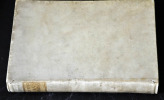

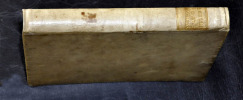



![Le Prince. Traduit d'Italien en Francoys Par Guillaume Cappel. - [THE BIRTH OF MODERN POLITICAL THOUGHT]. "MACHIAVELLI, NICCOLO.](https://static.livre-rare-book.com/pictures/LLX/57045_1_thumb.jpg)
![Le Prince. Traduit d'Italien en Francoys Par Guillaume Cappel. - [THE BIRTH OF MODERN POLITICAL THOUGHT]. "MACHIAVELLI, NICCOLO.](https://static.livre-rare-book.com/pictures/LLX/57045_2_thumb.jpg)
![Le Prince. Traduit d'Italien en Francoys Par Guillaume Cappel. - [THE BIRTH OF MODERN POLITICAL THOUGHT]. "MACHIAVELLI, NICCOLO.](https://static.livre-rare-book.com/pictures/LLX/57045_3_thumb.jpg)
